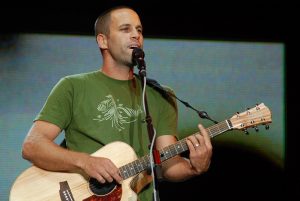During Jack Johnson’s performance at the Merriweather Pavillion on June 11, one thing became clear: Johnson is a far cry from the typical, moody rockstar. If his modest amble toward the microphone and charming opening remarks, “How you guys doing? You look good,” were not convincing enough, one only needed to look to the energy-saving LED lights, signs encouraging fans to buy reusable cups, or his wholesome, heartfelt lyrics to know he is one of the most likable musicians in the business.
Johnson, 42, exuded tremendous ease on stage. His charisma and gentleness when singing and playing guitar had a transformative power on the audience, spreading cheerfulness around the pavilion. The night began with a performance of “Rodeo Clowns,” a track from Johnson’s debut album, On and On, and was followed by songs from succeeding albums. The progression of the setlist loosely simulated a chronological tour through Johnson’s discography. While a lack of new material caused the show to feel somewhat stale, he compensated for the formulaic assemblage—a stacked deck of his biggest hits—by spotlighting band members and bringing guests on stage.
There were few surprises throughout the night, but they were welcomed by the audience when they happened, shaking up an otherwise humdrum show. Perhaps the best of those surprises was a guest performance by John Craigie, who sang an original song titled “I Wrote Mr. Tambourine Man.” Craigie, whose sound has undeniable Bob Dylan influences, invigorated the setlist of soft beach rock with his folk jams. Craigie’s coarse vocals contrasted with Johnson’s smooth ones and added texture to his polished performance.
Johnson has not released an album since 2013’s From Here To Now To You, but has been hard at work advocating for environmental sustainability, a passion which was reflected in the stage design. Abstract, tropical backgrounds projected onto the backdrop of the stage gave a sense of movement, and paper mache lanterns were strung under the roof, converging at the stage. Johnson is making a concerted effort on tour to reduce energy expenditure by using LED lights and asking guests to take accountability for their ecological footprints by avoiding the use of plastic at venues.
All At Once, Johnson’s advocacy initiative, is a testament to his good intentions. That being said, the same benevolent aura which accompanied each song and the bottled, feel-good melodies sometimes made the concert feel artificial, as if it were the set of a Sprint commercial rather than genuine performance art. Though the show felt stiff at first, Johnson slowly loosened up as members of the ensemble became more playful, generating energy for him to feed off of.
There was one minor hiccup in which Johnson forgot a verse mid-song, but he remained unruffled, joking about the mental lapse afterwards. While his coolness worked to his advantage in this regard, it also made it difficult to stay engaged in the performance.
Zach Gill, Johnson’s pianist, stole the show out from under the frontman, showcasing his piano skills first on “You And Your Heart,” then exciting the audience further by singing through a talk box on “Radiate,” and playing his accordion during “Tape Deck.” However, Gill’s musical versatility shone most during his vocal solo in “Bubbly Toes,” the most vibrant song of the night. Johnson and Gill’s arrangement of the song injected much needed liveliness into the laid-back atmosphere; Johnson traded in his acoustic guitar for an electric one and playfully transitioned into a cover of “The Joker.”
In an attempt to assert the show’s family-friendliness in spite of the copious amounts of alcohol and marijuana circling about, Johnson and his band dedicated the song “Upside Down” to all the kids in the crowd. To close the show, the opener, Lake Side Dive, rejoined Johnson on stage during his encore, playing a rendition of Bob Dylan’s “I Shall Be Released,” followed by Johnson’s own “Better Together.”
The audience was content at the end of the show, having been lulled into a blissful, sing-along induced stupor. The performance may have been saccharine and fairly predictable, but, in Johnson’s defense, it would be unfair to expect anything else from the man who broke into the US top 40 with a single written for the Curious George soundtrack. Sometimes, as in the case of Jack Johnson, it is a relief to not have to expect the unexpected.





